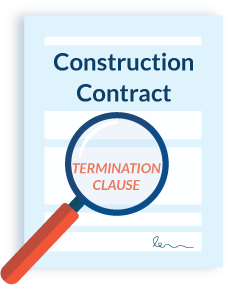

What Is a Termination Clause in a Construction Contract?
A termination clause controls the cancellation of a construction contract. Depending on the specific language used, the termination clause may set out how, why, and even when a contract may be terminated.
The provisions of the termination clause will shed a lot of light on what’s an allowable termination and what isn’t. Plus, if a termination isn’t done by the book, it could result in a legal battle. Having to terminate a party (or being terminated) is bad enough. Having to hash it out in court adds insult to injury.
Why Are Termination Clauses Necessary?
Before getting too far, we should address a simple question: Why are termination clauses even necessary? If the contract is breached by one party, shouldn’t the other party who didn’t breach be able to cancel the contract automatically?
Unfortunately, it’s not always that simple. Not all breaches of contract are made equally, and it can be hard to decide whether a breach is small or significant when the matter isn’t laid out in the contract. What might be a mountain to a customer could be a molehill to you. A termination clause can really help to take the ambiguity out of these situations.
Further, sometimes you may want to fire your vendor (or vice versa) for no (good) reason at all. Without support from the contract, that can be hard to do. With that in mind, let’s look at the types of termination clauses.
Types of Termination Clauses
There are generally two types of termination clauses:
- (1) Termination for Cause (also known as Termination for Default), and
- (2) Termination for Convenience
We’ll take a closer look at both.
1) Termination for Cause
Termination for default occurs because one of the parties to the contract “defaulted.” What this means is that they failed to perform something they were required to do. These clauses create situations where the contract may be terminated for a failure to perform specific or general duties under the contract.
On one hand, a termination for cause clause might be specific. It might set out certain situations where termination is appropriate, such as missing an important project milestone or failing to provide certain information or documentation. Where the contract has specifically designated situations where the agreement will be terminated, it can be pretty cut and dry when someone wants to terminate the deal.
On the other hand, a termination for cause or termination for default clause might be more general. It might say something more like, “Failure to complete obligations under the contract will result in termination,” or something to that effect.
When a termination for cause clause takes a more generic form, things can get murkier for a party that wants to terminate the deal. If the failure to perform is minimal, or if it can be easily corrected, then the termination of the entire contract might not be appropriate.
In fact, termination for cause or default often must be done for breaches that are so material that the breach has the effect of defeating the very terms of the contract.
Full Breakdown Here:
Termination for Cause | When Can Construction Contracts Be Terminated for Cause
2) Termination for Convenience
Although initially used in just government contracts, these convenience provisions have become more prevalent in private contracts, too. A termination for convenience clause gives the owner the right to terminate the contract at any time and for any reason. Pretty serious, right?
When one side just decides they want to cancel the contract, the term for that is typically a “breach of contract.” However, when a termination for convenience clause is present, one side might be able to cancel the deal for no reason whatsoever. Since it’s essentially creating a contract with an easy out, it’s been lovingly referred to as a “construction prenup.”
Full Breakdown Here:
Termination for Convenience| Can Your Customer Terminate You Without Good Reason?
Limitations of Termination Clauses
In construction and in law, things are never quite cut and dry. There’s always room for interpretation.
When looking at a cancellation clause, general contract principles will still apply, making it harder to enforce termination for convenience clauses. Although I stated that a termination for convenience clause may be used for any reason, in reality, there are some limitations.
For instance, basic contract law states that there is an implied covenant of good will and fair dealings. Thus, it could be argued that an owner terminating the contract for convenience in bad faith is essentially just a breach of contract. That’s why courts will tend to look for some sort of changed circumstances that warrants the use of the clause.
Termination Isn’t Necessarily a Clean Break
With construction being such a volatile industry, it’s not all that uncommon for a contract to be terminated. But remember – exercising a cancellation clause has significant consequences for all parties. In many (if not most) situations, utilizing this clause won’t simply result in an immediate clean break.
For one, just because a project participant has been terminated doesn’t mean that payment doesn’t need to be made for the work they’ve already performed. Terminated contractors, subs, and suppliers aren’t powerless. If they’re owed money, they could still be entitled to exercise their mechanics lien rights, payment bond rights, or other forms of recovery.
At the same time, the party terminating the contract might have the ability to deduct from amounts owed to the party who was terminated. That’s common where there’s a defect in the work or material provided or where replacing the terminated party results in a cost increase, among other situations.
Bottom line? Flexing a termination clause — either a termination for convenience or a termination for cause or for default — doesn’t mean you’re getting off scot-free. Construction terminations can easily turn into drawn out, ugly affairs. If there’s another option — like working with the other party instead of terminating them — it very well may be cheaper, less stressful, and result in a better outcome for all.
Related Resources from Levelset
- Deductive Change Order vs. Partial Termination for Convenience | When Scope of Work is Reduced
- Download a Simple Construction Contract Template
- Ask a Legal Question and Receive an Answer from a Licensed Construction Attorney on Levelset’s Construction Legal Center

